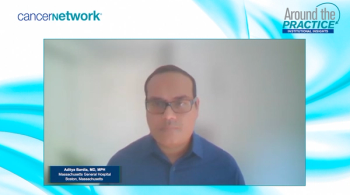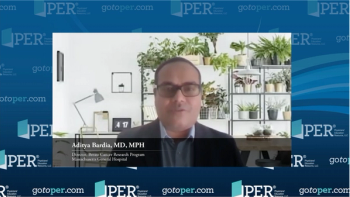
Expert oncologists look toward future utilization of circulating tumor DNA testing and consider how the field of oncology may evolve.

Your AI-Trained Oncology Knowledge Connection!


Expert oncologists look toward future utilization of circulating tumor DNA testing and consider how the field of oncology may evolve.

Shared insight on how circulating tumor DNA may be used in real-world clinical practice to improve the value of cancer care.

Focusing broadly on breast cancer, expert oncologists detail how ctDNA may impact patient monitoring and treatment decisions moving forward.

Moving on to the second patient scenario, panelists elucidate the value of ctDNA in patients with triple-negative breast cancer.

In the context of clinical trial data and personal experience, experts weigh the value of circulating tumor DNA as a tool in cancer care.

Experts share their perspective on clinical trial data driving the use of circulating tumor DNA in various settings of cancer care.

Focusing on breast cancer, lung cancer, and GI cancers respectively, expert oncologists review the utility of circulating tumor DNA assays.

Expert panelists elucidate the mechanisms of ctDNA and MRD testing, providing a broad perspective on how they are used in cancer care.

Shared insight on the potential roles of ctDNA and MRD testing in the monitoring and treatment of patients with colorectal cancer.

Centering discussion on a patient scenario of stage II colorectal cancer, expert oncologists consider how ctDNA may inform use of adjuvant chemotherapy in this setting.

Program chair Aditya Bardia, MD, MPH, invites you to PER®’s complimentary in-person and virtual satellite symposium.

Experts discussed the changing landscape in treatments for HER2-positive metastatic breast cancer.

Experts close out their discussion on the management of HER2+ metastatic breast cancer by highlighting their hopes for future treatment strategies.

Centering their conversation on a patient case, experts discuss the sequencing and monitoring of therapy in patients with HER2+ metastatic breast cancer.

Panelists field questions from a live audience regarding the optimal selection of therapy for patients with metastatic breast cancer.

In another patient case, panelists break down third-line therapy options for someone with HER2+ metastatic breast cancer and lung disease.

Moving to optimal treatment approaches in second-line therapy, experts close out a patient case of HER2+ metastatic breast cancer.

Using a patient case to center their discussion, the panel reviews frontline treatment options for HER2+ metastatic breast cancer and the rationale behind selection.

Fielding questions from a live audience, experts discuss the lack of biomarkers in HER2+ metastatic breast cancer and how one might address progression of bone disease.

A panel of experts reviews clinical trial data in recurrent HER2-positive metastatic breast cancer and discusses impacts on treatment selection.

Panelists provide an overview of the treatment landscape for patients with HER2-positive metastatic breast cancer.

This review article published in the journal ONCOLOGY® looks at the successful clinical development of immunotherapies, PARP inhibitors, and antibody-drug conjugates for the management of metastatic triple-negative breast cancer and how these have improved the survival outcome of patients. Over the coming years, therapeutic developments in precision medicine will likely change the treatment landscape and might make the current definition of triple-negative breast cancer as a disease that is estrogen receptor, progesterone receptor, and HER2 negative obsolete.